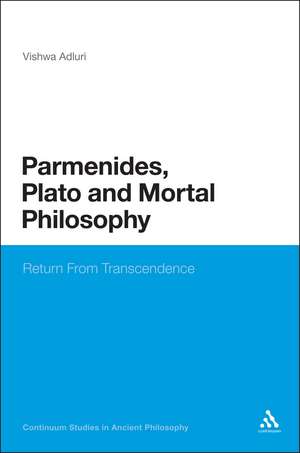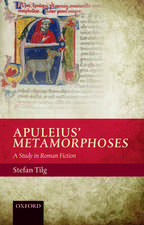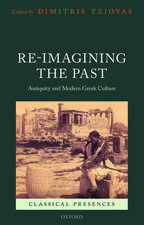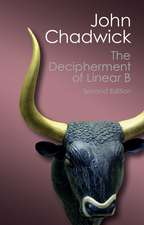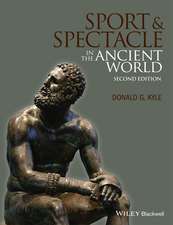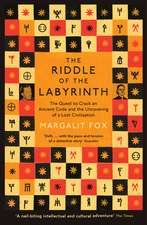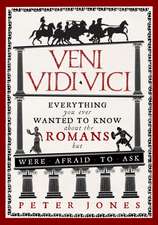Parmenides, Plato and Mortal Philosophy: Return From Transcendence: Continuum Studies in Ancient Philosophy
Autor Dr Vishwa Adlurien Limba Engleză Paperback – 26 aug 2012
| Toate formatele și edițiile | Preț | Express |
|---|---|---|
| Paperback (1) | 256.85 lei 6-8 săpt. | |
| Bloomsbury Publishing – 26 aug 2012 | 256.85 lei 6-8 săpt. | |
| Hardback (1) | 890.36 lei 6-8 săpt. | |
| Bloomsbury Publishing – dec 2010 | 890.36 lei 6-8 săpt. |
Din seria Continuum Studies in Ancient Philosophy
- 22%
 Preț: 256.59 lei
Preț: 256.59 lei - 22%
 Preț: 1005.41 lei
Preț: 1005.41 lei - 22%
 Preț: 883.86 lei
Preț: 883.86 lei - 22%
 Preț: 897.55 lei
Preț: 897.55 lei - 23%
 Preț: 236.19 lei
Preț: 236.19 lei - 22%
 Preț: 888.81 lei
Preț: 888.81 lei - 31%
 Preț: 949.08 lei
Preț: 949.08 lei - 31%
 Preț: 891.18 lei
Preț: 891.18 lei - 22%
 Preț: 947.11 lei
Preț: 947.11 lei - 23%
 Preț: 255.19 lei
Preț: 255.19 lei -
 Preț: 255.66 lei
Preț: 255.66 lei - 22%
 Preț: 889.88 lei
Preț: 889.88 lei -
 Preț: 255.11 lei
Preț: 255.11 lei -
 Preț: 256.38 lei
Preț: 256.38 lei -
 Preț: 256.02 lei
Preț: 256.02 lei -
 Preț: 255.66 lei
Preț: 255.66 lei -
 Preț: 255.66 lei
Preț: 255.66 lei - 14%
 Preț: 889.97 lei
Preț: 889.97 lei -
 Preț: 257.12 lei
Preț: 257.12 lei - 14%
 Preț: 946.72 lei
Preț: 946.72 lei
Preț: 256.85 lei
Nou
Puncte Express: 385
Preț estimativ în valută:
49.15€ • 51.44$ • 40.91£
49.15€ • 51.44$ • 40.91£
Carte tipărită la comandă
Livrare economică 31 martie-14 aprilie
Preluare comenzi: 021 569.72.76
Specificații
ISBN-13: 9781441166005
ISBN-10: 1441166009
Pagini: 240
Dimensiuni: 156 x 234 x 12 mm
Greutate: 0.33 kg
Editura: Bloomsbury Publishing
Colecția Continuum
Seria Continuum Studies in Ancient Philosophy
Locul publicării:London, United Kingdom
ISBN-10: 1441166009
Pagini: 240
Dimensiuni: 156 x 234 x 12 mm
Greutate: 0.33 kg
Editura: Bloomsbury Publishing
Colecția Continuum
Seria Continuum Studies in Ancient Philosophy
Locul publicării:London, United Kingdom
Caracteristici
Combines philosophical, literary and linguistic analysis to articulate a new understanding of Parmenides' philosophy.
Notă biografică
Vishwa Adluri is Adjunct Assistant Professor in Religion and Philosophy at Hunter College, City University of New York, USA, where he specializes in Ancient Philosophy, 20th Century Continental Philosophy, and Indian Philosophy.
Cuprins
Foreword \ Introduction: Parmenides and Renewing the Beginning \ Part I: Beginnings - Arkhai \ 1. Radical Individuality: Time, Mortal Soul and Journey \2. Parmenides and his Importance as a Beginner \ Part II: Parmenides \ 3. The Mortal Journey: Thumos (The Mortal Soul) and Its Limits \ 4. In the Realm of the Goddess: Logos and its Limits \ 5. At Home in the Kosmos: The Return \ Part III: Plato the Pre-Socratic \ 6. Reading Plato's Phaedrus: Socrates the Mortal \ Part IV: Forewording \ 7. Conclusion - Returning to Parmenides \ Part V: Translation of Parmenides' Peri Phuseos with Textual Notes \ Bibliography \ Index.
Recenzii
This brilliant and profound study is a compelling reinterpretation of Parmenides. But it is much more than this. It invites a re-reading not only of the western philosophical tradition inaugurated by Parmenides and Plato but also of ourselves as mortals dreaming of immortality. Adluri's deeply personal and inspired interpretation of philosophy's beginning points the way to its future.
Stands out for the radicality of its argument, the subtlety of its interdisciplinary interpretations, and the forthright passion that motivates it. His interpretive skill is on display not only in the body of the book, but also in the appendix which presents a new translation of Peri Phuseos with helpful notes. Adluri's work deserves a place on the reading list of every student of pre-Socratic thought.
In this highly original study of Parmenides' poem and Plato's response in the Phaedrus, Vishwa Adluri identifies the leading problem for both thinkers as "how do we speak/write about the finite, fragile, irreplaceable, incarnate fate of specific mortals, when language is, in some sense, outside of time? . . . It is for those who want to think in a new way about familiar works. Students of Parmenides, Plato, and indeed, of other philosophers who write narrative, will not look at these thinkers the same again after this provocative reading.
'Adluri has staked out a distinctive position on Parmenides' poem, and it is to be hoped that future writers on the subject will take it into account. More devoutly to be wished is that others who write on ancient philosophy will make the effort Adluri has to discover a voice in which to address issues of living philosophical concern through the careful reading of ancient thought.'
As a classicist, I found the book to be an interesting journey into reaches of Parmenides that I would not otherwise have had the opportunity to traverse... [It is]... beautifully written and rich with allusions to classical texts and readers of these texts.
As a field of interpretation, Parmenides' poem has been sown and cropped often enough that natural originality is a scarce affair. To this reader's delight, this book by Adluri...manages to coax from the poem a transformative take on the philosopher's vision by redirecting attention to the mythic and phenomenal material which encircles the goddess' logos and grounding the work in the journey of mortality.
Stands out for the radicality of its argument, the subtlety of its interdisciplinary interpretations, and the forthright passion that motivates it. His interpretive skill is on display not only in the body of the book, but also in the appendix which presents a new translation of Peri Phuseos with helpful notes. Adluri's work deserves a place on the reading list of every student of pre-Socratic thought.
In this highly original study of Parmenides' poem and Plato's response in the Phaedrus, Vishwa Adluri identifies the leading problem for both thinkers as "how do we speak/write about the finite, fragile, irreplaceable, incarnate fate of specific mortals, when language is, in some sense, outside of time? . . . It is for those who want to think in a new way about familiar works. Students of Parmenides, Plato, and indeed, of other philosophers who write narrative, will not look at these thinkers the same again after this provocative reading.
'Adluri has staked out a distinctive position on Parmenides' poem, and it is to be hoped that future writers on the subject will take it into account. More devoutly to be wished is that others who write on ancient philosophy will make the effort Adluri has to discover a voice in which to address issues of living philosophical concern through the careful reading of ancient thought.'
As a classicist, I found the book to be an interesting journey into reaches of Parmenides that I would not otherwise have had the opportunity to traverse... [It is]... beautifully written and rich with allusions to classical texts and readers of these texts.
As a field of interpretation, Parmenides' poem has been sown and cropped often enough that natural originality is a scarce affair. To this reader's delight, this book by Adluri...manages to coax from the poem a transformative take on the philosopher's vision by redirecting attention to the mythic and phenomenal material which encircles the goddess' logos and grounding the work in the journey of mortality.
